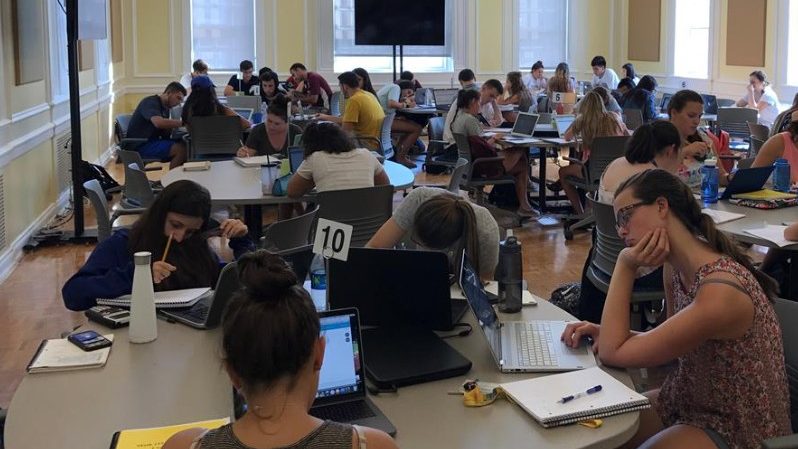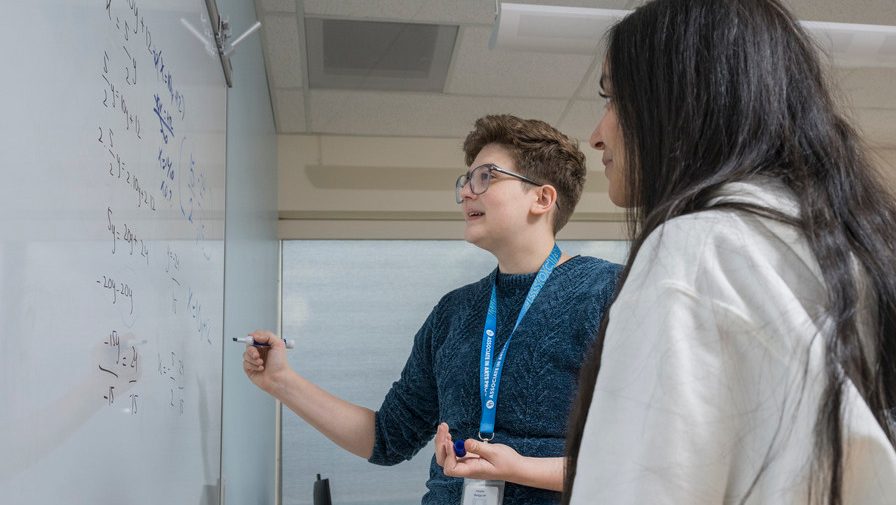
Math 117
Math 117 - Pre-Calculus for Scientists and Engineers
The information presented here is intended to describe the course goals for current and prospective students as well as others who are interested in our courses. It is not intended to replace the instructional policies and course materials presented in class.
The following information applies to the Newark campus. For information about satellite campus courses, please see the contact information at the bottom of this web site.
Every effort is made to update this information on a routine basis. However, if you have questions about enrollment, purchasing materials, and prerequisite skills, please check with your advisor or instructor.
The most updated Course Description can be found at the UD Course Description Search. Information on the sections currently offered can be found at the UD Course Search. More information can be found on the departmental syllabus.
This four-credit course will concentrate on analyzing and exploring the basic function classes (linear, quadratic, polynomial, rational, trigonometric, exponential, logarithmic, radical, and absolute value). Within these function classes, students explore their graphs and transformations of graphs, solve equations and inequalities, analyze applications, perform composition, determine inverse functions, and practice other important skills and understandings. In addition, this course prepares students for Math 241 Analytic Geometry and Calculus A by providing instruction on the skills and concepts needed for success in Math 241 and also provides a course similar to the level of intensity of Math 241.
The Math Placement Exam will assist in determining if you have the appropriate background for this course. Our experience has shown that students without appropriate mathematical background do not succeed in this important first semester course. The consequences can be severe. Unsuccessful students find themselves behind in their math course sequence and other science courses required for their major program and may not graduate in a timely manner.
The following list illustrates the topics intended for coverage in a typical semester. Your instructor may cover these topics in a different order or may add topics if necessary.
- Operations with Polynomials and Rational Expressions
- Exponents and Radicals
- The Cartesian Coordinate System: Graphing Equations, Circles, Symmetry
- Equations of Lines
- Functions – including Absolute Value, Radical, Piece-wise
- Relating Functions to Their Graphs
- Transformations of Functions
- Operations on Functions including Composition
- Inverse Functions
- Modeling with Functions
- Quadratic Functions
- Polynomial Functions
- Rational Functions
- Trigonometry – Unit Circle Approach
- Evaluation of Trigonometric Functions
- Graphs of Trigonometric Functions including Transformations
- Inverse Trigonometric Functions
- Angles – Radian and Degree Measure
- Right Triangle Trigonometry
- Law of Sines, Law of Cosines
- Trigonometric Identities and Formulas
- Trigonometric Equations
- Exponential Functions
- Logarithmic Functions
- Properties of Logarithms
- Exponential and Logarithmic Equations
- Applications of Exponential and Logarithmic functions.
65 or above, or a grade of C- or better in Math 010.
This course requires a strong intermediate algebra background. This includes the ability to perform operations with rational expressions and numerical fractions (without the use of a calculator), working with radicals and rational exponents, factoring polynomials, solving quadratic equations using the quadratic formula, solving absolute value equations and inequalities, and the ability to use algebra to solve word problems and other applications. Many of these topics are covered in a typical Algebra II course or Intermediate Algebra (Math 010) course.
Textbooks: The following are the textbook is typically used in this course. Students should wait until the first day of class to ensure the appropriate textbook and other course materials are purchased.
Precalculus: Mathematics for Calculus by Stewart, Loose-Leaf version. Also required is EWA (Enhanced Web Assign) associated with this text.
Calculator Requirement: Currently, graphing calculators are not allowed. A scientific calculator is required for exams.
Fall/Spring semester:
In most cases, during the fall and spring semesters, the course meets four hours per week in a MWF course lecture and a discussion on either Tuesday or Thursday. Assessment activities generally include tests, quizzes, and other course activities as determined by the instructor. Common, out-of-class exams including a cumulative final exam are usually required.
Winter/Summer semester:
This course is offered during some of the short sessions.
See Course Sections for sections currently offered.
There are several campus resources that provide additional assistance.
- Mathematical Sciences Learning Laboratory (MSLL) Open Lab: MSLL Open Lab provides free tutorial support for this course. The lab is staffed by qualified undergraduate students. This is a drop-in site – no appointment is needed. Students can work on their math homework, study for a math quiz or exam, and receive free tutorial assistance. More information can be found at the webpage: MSLL Open Lab
- Office of Academic Enrichment: Located at 148-150 South College Avenue, this site provides a number of different course resources for students. Please visit their website for more information.
Students enrolled at other campuses should contact the math faculty for the specific campus for additional information about this course.
- Dover Campus: Brad Thompson, bthompso@udel.edu
- Georgetown Campus: Matthew Willis, mjwillis@udel.edu
- Wilmington Campus: Alexia Mintos, amintos@udel.edu


